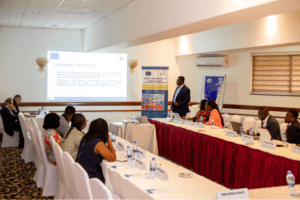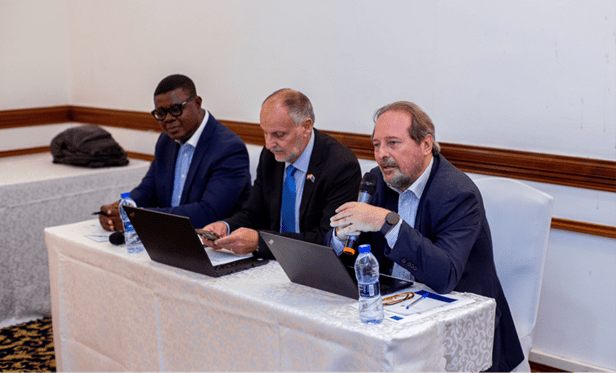The Compete Ghana Programme has successfully conducted a comprehensive two-day technical assistance training workshop for the Ministry of Trade and Industry on the implementation of the Ghana-EU Economic Partnership Agreement (iEPA) and related accompanying measures.
The aim of the workshop was to equip the 13 selected government institutions and regulators with the knowledge and expertise to foster economic growth and enhance trade facilitation between Ghana and the EU. It also provided guidance on the intricacies of the Ghana-EU IEPA. The programme is funded by the EU under the auspices of the Ministry of Trade and Industry.
The workshop marked the first of a series of 10 modules funded by the EU and implemented by Compete Ghana. Some institutions that benefitted from this training include Ghana Exports Promotion Authority, Ghana Standards Authority, Ghana Revenue Authority Customs Division, Ghana Shippers’ Authority and the Ghana International Trade Commission.
The Ghana-EU IEPA, which was signed in December 2016 and became effective for the EU in 2016 and for Ghana on July 1, 2021, aims to reduce trade barriers and enhance economic growth for both parties. Under the agreement, Ghana has been able to export its products duty-free quota free to the EU market, opening up significant opportunities for Ghanaian exporters.
Speaking on the significance of the training, Raffaele Quarto, Trade Counsellor – EU Delegation, expressed enthusiasm, stating: “Through this programme, we are delivering a number of trainings and activities. We want to make sure that this training will be very beneficial to the Ghanaian people. The success of this agreement will be measured by the increase in changes that will be made by the private sector”.
He highlighted the programme’s objectives, stating: “We want to make sure that the EU-Ghana economic partnership agreement benefits the economy of Ghana and that the different stakeholders in the Ghanaian economy can use it to their best advantage.
“We intend to train business associations and companies to make them more aware of the different elements and angles they need to consider when trading with Europe. By doing so, they can provide accurate information on their services, integrate this knowledge into their operations, and support businesses in Ghana to export and import more efficiently.”

Emphasising the significance of the workshop, Nicolas Gebara, Team Leader of the Compete Ghana Programme, stated: “The EU-Ghana Economic Partnership Agreement is crucial for reducing trade barriers and enhancing economic growth between Ghana and the EU. We are committed to providing knowledge and expertise to support Ghanaian exporters in facilitating their exports with the EU. Our programme selects potential exporters and strengthens their capacity to participate in international trade, ensuring they can take full advantage of the opportunities presented by the IEPA”.
The training received positive feedback from participants, who emphasised the importance of compliance to trade rules in attracting more investment for Ghana and driving an increase in exports. During the final day of the training on export requirements under the Ghana-EU EPA, participants from thirteen public institutions, including regulators and policy-makers, highlighted the significance of trade compliance for the sustainability of Ghanaian businesses.
Mr. Dode Seidu, a trade facilitation expert and trainer, emphasised that Ghana could enhance its competitiveness compared to neighbouring countries by broadly utilising and implementing trade facilitation. He stressed the importance of cooperation, harmonisation and simplification of activities among trade actors to better achieve trade facilitation. “If actors in trade are not compliant, they should not expect that the institutions involved in trade will accord them the benefits,” he added.
Participants expressed their commitment to making positive changes and improvements to trade facilitation in Ghana following the training. Madam Diana Amponsah, Head of Product Inspection Department at Ghana Standard Authority, emphasised the significance of transparency and simplification of trade facilitation processes to enhance Ghana’s competitiveness.
Another participant, Darko Osei from the Ghana Export Promotion Centre, described the training as enlightening, stating: “It has been very helpful and will help me direct our clients on the right procedures to ensure that they benefit fully from the Ghana-EU EPA’s”. He added that the training had a significant impact on forming new networks.










